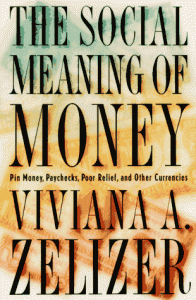 The rise of mobile payment apps like Venmo has made it much easier to, say, split a dinner tab, but this convenience comes along with worries about security and privacy. Further, could companies’ use of personal information about payments to target advertising reveal compromising details about our personal lives?
The rise of mobile payment apps like Venmo has made it much easier to, say, split a dinner tab, but this convenience comes along with worries about security and privacy. Further, could companies’ use of personal information about payments to target advertising reveal compromising details about our personal lives?
Venmo, for instance, is explicitly “not just a mobile payment app”—it’s also a social media platform that broadcasts its users’ payment activities to their friends. Cameron Tung discusses some of the implications in Slate. Mobile sharing of payment information helps us attach social meanings to financial transactions, and $100 spent in a restaurant is not the same as $100 spent on a phone bill. Sharing details about whom we’re paying and when opens our financial activity to social scrutiny. Don’t want your spouse or partner to know about the fancy dinner you had last weekend? Better not pay with Venmo.
To support this point, Tung cites Princeton sociologist Viviana Zelizer’s work on payments and social ties. We should think about each monetary transaction, according to Zelizer, as a gift, an entitlement, or compensation: “each one corresponds to a significantly different set of social relations and systems of meanings. People making payments use a number of earmarking techniques to distinguish those categories of social relations and meanings from each other.”
When Zelizer wrote about Christmas bonuses, for instance, she found that whether employers and employees thought about bonuses as gifts, compensation, or entitlements had a profound effect on the relationships between bosses and workers. Mobile payment platforms allow us to attach similar meanings to everyday transactions, broadcasting these meanings to our friends. As we consider the privacy and security implications of convenient mobile services, we also need to think about their cultural implications. Though we might want to use sharing apps strategically to cultivate particular online personas and identities, we may not always be able to predict how others’ will attach meanings to our payments.

Comments 4
Harrison Mansom — April 6, 2021
you know, I was also looking for payment methods once and came across one site, this https://date-fns.org/ there is a lot of information about this and there I found leafletcasino, there I learned about Interac the most reliable payment method.
Lola — February 20, 2022
Unfortunately, phishing also occurs among mobile apps. For example, hackers published a fake Trezor wallet app on Google Play several times, in which users entered their own seed phrases. So be careful if you use a cryptocurrency wallet on Android and check the authenticity of the app. The App Store has stricter moderation, but fraudulent apps are sometimes found there as well. Back in January 2021, hackers discovered a vulnerability in an outdated version of iOS, which allowed attackers to gain access to smartphones and in some cases to wallets, as well as user self-installed mobile app trading bots that do not actually trade cryptocurrency, but just steal user data, from the reviews scammerwatch.com
Victoria Wilson — January 30, 2023
Interesting book! I keep thinking of trying my hand at trading, but I'm not sure if it's a scam. I heard that if you do technical analysis yourself, you can get better results from trading. Where can I learn more about it?
Marianna — January 31, 2023
Personally, I advise all my friends to start studying trading with this https://tabtrader.com/academy/articles/what-are-meme-coins-doge-shib article. It's easy and uncomplicated to get you interested and up to speed, but you have to be in a good mood when you're doing anything.